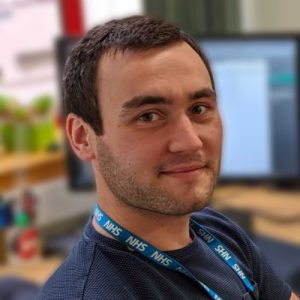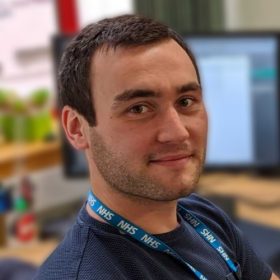Andy Mayne joined PenARC as a PenCHORD Honorary Associate Research Fellow in 2022. In this opinion piece he tells us about his work and how working collaboratively with academic researchers contributes to a culture of improvement and better health and social care.
The background
I’m Head of Data Science, Artificial Intelligence & Operational Research at PenARC partner organisation, Somerset NHS Foundation Trust.
I manage a small, focussed team using technology and science to try to understand the challenges of the future. We work closely with universities to try to spread our learning, as well as make it easier for others to get involved. As this is a relatively new type of work in the NHS, I write strategies, papers, and policies to make sure all the work is done safely and ethically and complies with laws like GDPR.
understand the challenges of the future. We work closely with universities to try to spread our learning, as well as make it easier for others to get involved. As this is a relatively new type of work in the NHS, I write strategies, papers, and policies to make sure all the work is done safely and ethically and complies with laws like GDPR.
I’m also digital lead for the Southwestern Secure Research Environment, working alongside a group of fantastic colleagues from across the region to make research in healthcare easier, more secure and coordinated. I strongly believe in working together and an open healthcare data community which is why I am the lead for the Southwestern Analytics & Infrastructure in Healthcare (SWAIH) Group.
Around two years ago, to ensure I keep up with the research world, I joined PenARC as an Honorary Associate Research Fellow. I wanted to explore my own area of research; impact analysis of causal inference in simulation models. Before this I’d worked on exploring a way of predicting prehospital (ambulance) demand. We had a model, but we weren’t sure whether it was the best it could be, so we needed someone to review our methodology. I wanted to avoid using business consultancy as it’s expensive and they rarely have the applied healthcare understanding. PenCHORD fitted the bill for what we needed perfectly, we worked with them for around a year, eventually publishing a paper.
“Research drives innovation and change, so any NHS organisation that wants to create and embed a true culture of improvement should work closely with their local ARC or Universities.”
We continued to work on various projects together, including predicting trajectories of COVID-19, the IPACS project and various bids over the years. Since joining PenCHORD I have found it much easier to find out about the latest techniques, get involved in new studies and ask questions about areas of data science or operational research that I was unsure or confused about. I’d recommend this model of working to other NHS organisations. Research drives innovation and change, so any NHS organisation that wants to create and embed a true culture of improvement should work closely with their local ARC or Universities. Breaking down the barriers will massively increase the learning within your organisation, and ultimately provide better care for patients, improve staff welfare, and improve your organisations operational efficiency.
“Since joining PenCHORD I have found it much easier to find out about the latest techniques, get involved in new studies and ask questions about areas of data science or operational research that I was unsure or confused about.”
Meeting the challenges
“PenARC are bringing together all the components that make up good quality data….to begin a constructive conversation about improving how data is used in the Southwest.”
Over the past four years there has been a huge amount of change in how data is used, and will be used, in the NHS. Two large drivers, the Data Saves Lives strategy and the Goldacre review have set a vision that will revolutionise the analytical space.
PenARC are bringing together all the components that make up good quality data; Analysts, Scientists, Researchers, Senior Decision Makers, IT, Cybersecurity Analysts, Information Governance professionals at an event in July called SWAIH, to begin a constructive conversation about improving how data is used in the Southwest.
“We all have the same issues to overcome, so why not do it together?”
If we are to realise this vision of better data, we need to work openly and collaboratively. Whilst the NHS is segmented into Integrated Care Systems, patients don’t use our services this way, we need to work together to provide equitable high-quality care. We all have the same issues to overcome, so why not do it together?
The NHS continues to experience and work under extreme pressures; COVID-19, a looming recession, staff shortages and the increasingly complex medical needs of an ageing population. NHS Trusts have tried to implement every change possible through financial redistribution, restructuring, merging with other Trusts. Simply put, there is not enough money to solve the capacity and pressure issues. However, there is a huge world of untapped potential in Data Science, Operational Research and open ways of working.
If the NHS utilised the power of Data Science and Operational Research, we could stop firefighting and being on the backfoot of the pressures we face and embrace a culture of predictive, preventative, preparatory and improvement-based analytics that drives our resilience forwards.
***
A PenARC perspective
Chrissie Walker, PenCHORD’s Research and Operations Manager, has been working closely with Andy to develop plans for SWAIH.
She said: “PenARC works with healthcare partners to identify and respond to their priorities for research. Hosting Andy as an honorary research associate in PenCHORD meant we were able to respond quickly to his suggestion for a regional event.
SWAIH, on July 17th, will bring together organisations from across the South West to discuss recent policies around healthcare data and current plans for a regional Secure Data Environment (SDE).
It’s been fantastic to see the positive response from organisations – to understand how much interest there is from our partners to build connections with their peers, share what is happening across the region and learn about plans for the SDE. PenARC has an amazing network stretching right across the South West peninsula, and it’s been brilliant to be able to use this to bring people together.”

Author

